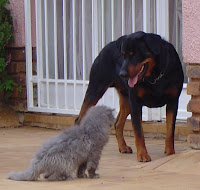Prošlo vreme, or Perfekt, as we call it in Serbian, is the past tense which covers all the English past tenses (the Past Simple, Past Continuous, Present and Past perfect). It is most commonly used tense for expressing past time events. The Aorist tense is also used, though not that often.
Formation of PERFECT in Serbian
Here is the formula for the Past Tense in Serbian:
LONG FORM:
Subject + present of TO BE + Past Participle (or literally: ' past participle adjective ' = glagolski pridev radni) For a very thorough explanation check this link.
Ti si plesala. (You were dancing.)
SHORT FORM:
Past Participle + present of TO BE
Plesala si.
It is formed by replacing the 'i/e/ati' or 'ći' infinitive ending of the verb with the past participle endings as follows:
Masc. Sg -o
Fem. Sg - la
N. Sg -lo
Masc. Pl -li
Fem. Pl - le
N. Pl -la
I will use the opportunity of this excellent video to introduce past tense verbs:
Novak je pobedio Federera.
Novakova devojka je skakala od sreće, a njegovi prijatelji su se radovali.
Federer je polomio reket, a posle je bacao flaše, što možete videti na snimku.
* With reflexive form of the word, the auxilliary "to be" is dropped in the third person singular, so :
"She woke up" = Ona se probudila. or Probudila se. (instead of ona je se probudila, or probudila je se)
For more Serbian video lessons check this page.
Formation of PERFECT in Serbian
Here is the formula for the Past Tense in Serbian:
LONG FORM:
Subject + present of TO BE + Past Participle (or literally: ' past participle adjective ' = glagolski pridev radni) For a very thorough explanation check this link.
Ti si plesala. (You were dancing.)
SHORT FORM:
Past Participle + present of TO BE
Plesala si.
It is formed by replacing the 'i/e/ati' or 'ći' infinitive ending of the verb with the past participle endings as follows:
Masc. Sg -o
Fem. Sg - la
N. Sg -lo
Masc. Pl -li
Fem. Pl - le
N. Pl -la
I will use the opportunity of this excellent video to introduce past tense verbs:
Novak je pobedio Federera.
Novakova devojka je skakala od sreće, a njegovi prijatelji su se radovali.
Federer je polomio reket, a posle je bacao flaše, što možete videti na snimku.
* With reflexive form of the word, the auxilliary "to be" is dropped in the third person singular, so :
"She woke up" = Ona se probudila. or Probudila se. (instead of ona je se probudila, or probudila je se)
For more Serbian video lessons check this page.

.png)























